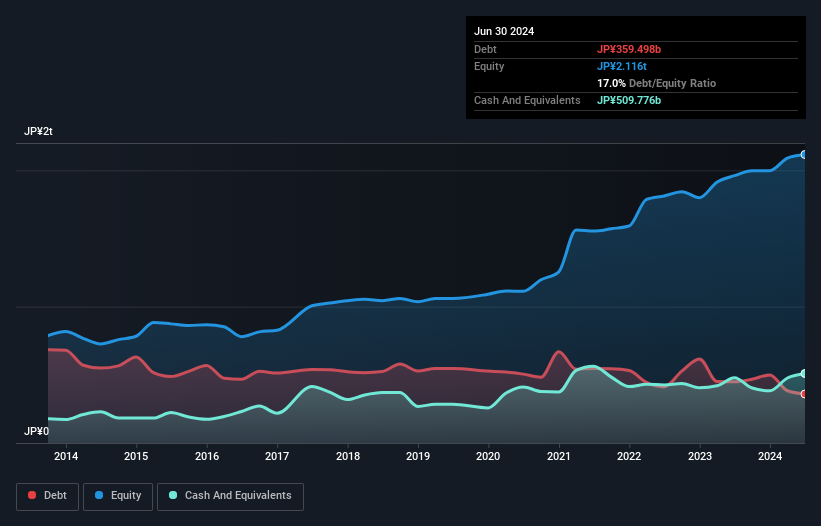
Warren Buffett famously said, 'Volatility is far from synonymous with risk.' It's only natural to consider a company's balance sheet when you examine how risky it is, since debt is often involved when a business collapses. We note that NEC Corporation (TSE:6701) does have debt on its balance sheet. But the real question is whether this debt is making the company risky.
When Is Debt Dangerous?
Debt and other liabilities become risky for a business when it cannot easily fulfill those obligations, either with free cash flow or by raising capital at an attractive price. Part and parcel of capitalism is the process of 'creative destruction' where failed businesses are mercilessly liquidated by their bankers. However, a more usual (but still expensive) situation is where a company must dilute shareholders at a cheap share price simply to get debt under control. By replacing dilution, though, debt can be an extremely good tool for businesses that need capital to invest in growth at high rates of return. The first step when considering a company's debt levels is to consider its cash and debt together.
View our latest analysis for NEC
What Is NEC's Net Debt?
The image below, which you can click on for greater detail, shows that NEC had debt of JP¥359.5b at the end of June 2024, a reduction from JP¥448.3b over a year. But it also has JP¥509.8b in cash to offset that, meaning it has JP¥150.3b net cash.

How Strong Is NEC's Balance Sheet?
The latest balance sheet data shows that NEC had liabilities of JP¥1.30t due within a year, and liabilities of JP¥708.8b falling due after that. Offsetting these obligations, it had cash of JP¥509.8b as well as receivables valued at JP¥503.4b due within 12 months. So its liabilities outweigh the sum of its cash and (near-term) receivables by JP¥995.5b.
While this might seem like a lot, it is not so bad since NEC has a huge market capitalization of JP¥3.53t, and so it could probably strengthen its balance sheet by raising capital if it needed to. However, it is still worthwhile taking a close look at its ability to pay off debt. While it does have liabilities worth noting, NEC also has more cash than debt, so we're pretty confident it can manage its debt safely.
And we also note warmly that NEC grew its EBIT by 13% last year, making its debt load easier to handle. The balance sheet is clearly the area to focus on when you are analysing debt. But ultimately the future profitability of the business will decide if NEC can strengthen its balance sheet over time. So if you want to see what the professionals think, you might find this free report on analyst profit forecasts to be interesting.
Finally, while the tax-man may adore accounting profits, lenders only accept cold hard cash. NEC may have net cash on the balance sheet, but it is still interesting to look at how well the business converts its earnings before interest and tax (EBIT) to free cash flow, because that will influence both its need for, and its capacity to manage debt. During the last three years, NEC produced sturdy free cash flow equating to 70% of its EBIT, about what we'd expect. This cold hard cash means it can reduce its debt when it wants to.
Summing Up
While NEC does have more liabilities than liquid assets, it also has net cash of JP¥150.3b. And it impressed us with free cash flow of JP¥185b, being 70% of its EBIT. So is NEC's debt a risk? It doesn't seem so to us. When analysing debt levels, the balance sheet is the obvious place to start. However, not all investment risk resides within the balance sheet - far from it. We've identified 1 warning sign with NEC , and understanding them should be part of your investment process.
If you're interested in investing in businesses that can grow profits without the burden of debt, then check out this free list of growing businesses that have net cash on the balance sheet.
Valuation is complex, but we're here to simplify it.
Discover if NEC might be undervalued or overvalued with our detailed analysis, featuring fair value estimates, potential risks, dividends, insider trades, and its financial condition.
Access Free AnalysisHave feedback on this article? Concerned about the content? Get in touch with us directly. Alternatively, email editorial-team (at) simplywallst.com.
This article by Simply Wall St is general in nature. We provide commentary based on historical data and analyst forecasts only using an unbiased methodology and our articles are not intended to be financial advice. It does not constitute a recommendation to buy or sell any stock, and does not take account of your objectives, or your financial situation. We aim to bring you long-term focused analysis driven by fundamental data. Note that our analysis may not factor in the latest price-sensitive company announcements or qualitative material. Simply Wall St has no position in any stocks mentioned.
About TSE:6701
NEC
Provides information and communication technology solutions in Japan and internationally.
Flawless balance sheet with solid track record.
Similar Companies
Market Insights
Community Narratives


